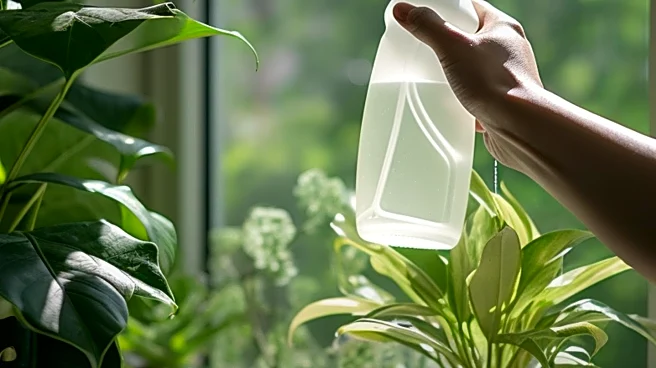What is the story about?
What's Happening?
A recent article highlights the use of certain houseplants as a natural method to repel insects without resorting to chemical sprays. These plants, including herbs like basil, mint, sage, and rosemary, release scents and oils that deter common pests such as house flies and fruit flies. Marigolds, lavender, catnip, chrysanthemums, and carnivorous plants like the Venus flytrap are also noted for their insect-repelling properties. These plants not only enhance the aesthetic appeal of a home but also serve practical purposes by keeping bugs at bay. The article suggests placing these plants strategically in kitchens to create a fresher environment while protecting against unwanted guests.
Why It's Important?
The use of houseplants as natural insect repellents is significant as it offers a sustainable and eco-friendly alternative to chemical sprays, which can be harmful to both humans and the environment. This approach aligns with growing consumer preferences for natural and organic solutions in home care. By reducing reliance on chemical products, homeowners can minimize exposure to potentially toxic substances, contributing to healthier indoor air quality. Additionally, these plants can serve dual purposes, providing culinary benefits and enhancing home decor, making them a cost-effective choice for pest management.
What's Next?
As awareness of natural pest control methods grows, it is likely that more homeowners will adopt houseplants as part of their pest management strategies. This trend could lead to increased demand for these specific plants, potentially influencing market dynamics in the gardening and home improvement sectors. Retailers may expand their offerings to include a wider variety of insect-repelling plants, and educational resources on plant care and placement could become more prevalent. Furthermore, research into additional plant species with similar properties may continue, broadening the options available to consumers.
Beyond the Headlines
The shift towards using houseplants for pest control reflects broader societal trends towards sustainability and environmental consciousness. This movement may encourage further innovation in natural home care solutions, fostering a culture of eco-friendly practices. Additionally, the integration of plants into home environments can have positive psychological effects, promoting relaxation and well-being. As consumers become more informed about the benefits of natural alternatives, there may be a cultural shift towards valuing and preserving biodiversity within domestic spaces.

















